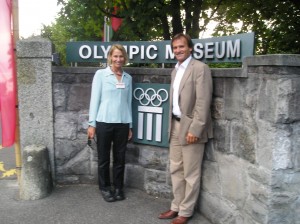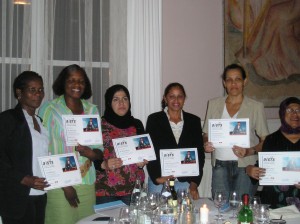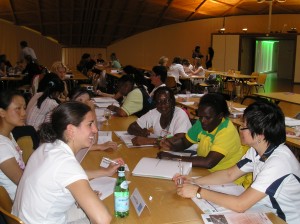“Where are you from?” is the question asked most often during the Sport Management Seminar for Women, organized by the International Academy of Sports Science and Technology (aiSTS) based in Lausanne, Switzerland. My geographical ignorance is apparent when I hear answers like “Lesotho” “Qatar” and “Belize,” and then must ask, “Where’s that?”
Lausanne is located on the North Shore of Lake Geneva. The lake is surrounded by the jagged Alps winding through France, Germany, Italy and Switzerland. Sailboats, water skiers and graceful swans dot the giant lake during the warmer months. Stately old Victorian looking buildings fill Lausanne where most of the people speak French.
Besides being a beautiful place, Lausanne is considered the sports capital of the world. It’s the home of the Olympic International Committee (IOC), dozens of other sport federations, is host to Ahletissima, a world-class track and field competition, and other sport events.
Eighty people registered for aiSTS’s fourth annual seminar on management skills for women held September 1 – 4, 2008. Most of the participants are women who work for their country’s Olympic Committees. The women represent fifty different countries including Bhutan, Nepal, Maldives, Croatia, Ghana, China, Taiwan, Guatemala, Denmark, Iceland, Mali, Ghana, Belize, Fiji, Slovenia, Aruba, Zimbabwe. Czech Republic, Qatar, Nigeria, and Spain. It is the first time in my life I am ever with so many people from different countries all at the same time.
The seminar participants share an interest in sports and equality for women competing in and governing sporting events. Dr. June Canavan, a well-respected sports doctor from Australia, opened the seminar with an inspiring presentation showing the history and hurtles that women have faced in the sports world. At the conclusion of her talk I have the urge to stand up and applaud!
aiSTS was founded by people from different areas including the International Olympic Committee, Ecole Polytechnique Federale de Lausanne, IMD Business School, University of Lausanne, University of Geneva, University of Neuchâtel, IDHEAP (an independent foundation associated with the University of Lausanne and the Swiss Federal Institute of Technology) HES Valais (University of Applied Sciences Western Switzerland), Lausanne City and Canton of Vaud. aiSTS is a graduate program that provides a masters degree on sport program and event management. Claude Stricker is director of aiSTS. Claude’s interest in sports comes from his life long pursuit of athletics. As a teenager he was on the Swiss national ski patrol; he is a skilled windsurfer; and is an all around fit athlete.
Over ten years ago we met out windsurfing at Diamond Head on O‘ahu where I live. Diamond Head is a popular windsurfing spot, especially during the summer when there are south swells. One morning I am riding a wave toward the beach and a guy windsurfing past me out toward the waves, leans around his mast and yells something to me. It takes a few moments before I realize that he said: “Lorenn, wife of Jim.”
A couple days earlier, my husband Jim told me he’d met a “Swiss guy” at the University of Hawai‘i who also liked to windsurf Diamond Head where I was going to practice for windsurfing contests. Claude was in Hawai‘i doing research and windsurfing. During the 1990s, both he and I competed in the same windsurfing contests. In 2007 he asked me to come to Lausanne and provide training on conflict management at the 2008 seminar. In his kind French accent he said: “Lorenn you must come to the seminar because you are an athlete.”
The International Olympic Committee (IOC) is one of the seminar’s sponsors. The IOC provided 38 women with scholarships to attend the seminar where we learn about each others lives.
“What is it like living in Zimbabwe?”
“It’s terrible. We cannot buy food,” we hear at lunch from a woman living in Zimbabwe. A woman from South Africa is compassionate toward her Zimbabwean neighbor despite the recent problems between some residents of the two countries.
Other women whose countries are also at odds with each other including China and Taiwan, South and North Korea, the United States and Iran, share similar understandings after being together for the four days of the seminar.
Icelandic participant Jo’na Hilder Bjarnadottir, who works with her country’s Olympic committee, said: “Hearing the other women’s experiences in their countries, working in their homes and their cultures made me stronger and more emotional. It helps me see my situation is not so bad.” She also said “We can come home and do something with woman power.”
Nada Cerna with the Ceska Olympic Committee found that the seminar “refreshed and inspired” her. She especially appreciated that it was held in Lausanne. It was a “dream state” she said. She also found the workshop as a whole “empowerful.”
Nigerian participant Joy Ewomazino Oyibo said: “I loved the organization. The workshop organization was well designed and carried out. aisTS knows how to prepare things well.” Clare Lobb with the IOC said she found: “The variety of topics was great. I learned a lot.”
The seminar brought women of diverse cultures together where they came to understand they are all working for similar things and facing similar challenges. They learned from each other. The seminar had the effect of peace building and illustrates how sports and Olympic programs can help improve our world. It was clearly an “empowerful” experience.
Claude Stricker and I at the Olympic Museum.
Seminar participants with their certificates of completion closing night of seminar.
Seminar participants.



I enjoyed the article Lorenn! 🙂